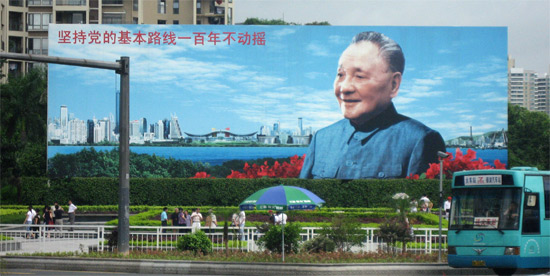Twenty Years Ago, Deng Changed China Forever

The “socialist market economy” was born this week in 1992
Op-Ed Commentary: Chris Devonshire-Ellis
Jan. 16 – An anniversary occurs this week that may well go unnoticed by many – the 20th year since Deng Xiaoping, China’s premier at the time, visited Shenzhen as part of an unusual South China tour. To set the scene to recall why this was so important an event is to remember that China had not really fully opened up its economy on the back of reforms instigated by Deng in the late 1980s. What had at one stage seemed to be a sincere movement to open the country up came to a shuddering halt in the aftermath of the Tiananmen incident. I was in China at that time, employed by Asia Law & Practice (now part of Euromoney) – it was to be a further few months before I was to establish my firm, Dezan Shira & Associates. That I did so was almost entirely down to Deng’s visit.
But China had regressed in those early reforms, and the pre-Tiananmen experiment of loosening up China’s market to foreign investment was losing pace fast. Visiting Beijing both before and after the problems revealed a nation still traumatized by the Cultural Revolution – it was difficult to even mention the word “Tiananmen,” and what had once been friendly and inquisitive Chinese faces had regressed again to a sense of fear and withdrawal.
I attended a trade event in Beijing just six months after Tiananmen – it was to have been a huge turnout, but hardly anyone came. I wandered near empty halls stuffed with sour-faced attendants – the equivalent of the famous Canton Fair specializing in funerals.
China’s much vaunted reforms seemed to have disappeared in smoke. Deng too, after Tiananmen, effectively retired. While still premier, he was elderly, and handed over the daily running of the country to his protégé, Jiang Zemin. A cloud seemed to hover over the entire country – depressed, stifling and unable to be blown away in the harsh reality of international condemnation of what had occurred in Beijing. China, for a good three years, was the world’s bogeyman all over again.
Hong Kong, meanwhile, still partied like it was 1997. Uncertainty resulted in a surreal atmosphere as the local economy boomed even as the days were drawing closer towards an eventual handover. Locals scrambled to get Canadian passports, while just across the border at Shenzhen, a huge hangover of a dangerous flirtation with democratic freedoms continued. In reality, the events at Tiananmen had provided a platform for the more conservative of China’s leaders to step back from the reforms instigated by Deng and to go back to hardline communism. While Hong Kong and Taiwanese businessmen did okay, it was still a very difficult market for foreign investors, who were not trusted and not entirely welcomed.
The only exception to this was the southern Chinese town of Shekou, part of Shenzhen, and a deep water port. Shenzhen itself was effectively sealed off from the rest of China as an experiment in market reforms and its proximity attracted Hong Kong-based businessmen looking for to space and land with which to set up the manufacturing industry that was leaving Hong Kong due to high land costs. Shekou was out on a limb from even that – Deng had realized that China was energy poor and had allowed foreign oil drilling and exploration companies to explore the South China Sea. As a result, a mini oil town had sprung up around the port.
Texans, Scots and Norwegians prowled the bars, rode Harley Davidsons shipped over as “essential drilling equipment,” chased a few girls around, and generally did a month on and two weeks off as they strove to establish what was to become a cornerstone of China’s oil industry. Talk was all of the rigs, and of typhoons, and the naivety of the Chinese operator CNOOC. In fact, some of China’s first JVs were with CNOOC (I was later to handle several of them), as Shekou spearheaded the search for oil in China. But Shekou and Shenzhen aside, the rest of China was moribund.
But by 1992, Deng had had enough. Seeing that China was directionless and heading back towards stagnation and international isolation, he effectively took himself out of self-imposed retirement, and embarked on a well-publicized “Tour of South China.” He was still premier and – although aged 88 – still head of the CPC.
He traveled by train, taking in Wuhan, then to Guangzhou, Shenzhen, Zhuhai and finally to Shanghai. His message was clear – to do away with the conservatives and to place China on a journey of reform that could not be undone. By the time he got to Shenzhen, he had got into his stride. Declaring in Shekou that “To get rich is glorious” he cleared away political doubts about embarking on reforms by suggesting that the market economy could be seen as socialist. Both these phrases have been handed down ever since, be it “socialism with Chinese characteristics” or “market socialism” – they were coined in Shekou on board the State Yacht the Minghua, berthed there at the time.
He also put the specter of hardline communism back in its box by stating that within the Communist Party “the left hand tendencies are currently more dangerous than the right” and as paramount leader these words placed the conservative elements as individuals to be avoided. He succeeded – the Chinese media and CCP picked up his words and ran them everywhere. For a country still hurting from Tiananmen, this was a real boost. Arriving in Shanghai – always that most-commercial of Chinese cities – he was feted again as a savior. That city, and the rest of China, was back in business and this time it was to last.
It was rash, but I wanted to be part of that experiment and commitment to building a new China, and in November I set up Dezan Shira & Associates. For China, it was the very beginning of what was the first step on a journey to becoming the second largest economy in the world, 20 years ago this week.
Chris Devonshire-Ellis is the founding partner of Dezan Shira & Associates, setting up the practice in 1992, originally in Shenzhen. Specializing in providing foreign direct investment legal, due diligence, tax planning and business advisory services, the practice now maintains eleven China offices and one in Hong Kong, in addition to offices in India, Vietnam and Singapore. Please contact the firm at china@dezshira.com or visit their web site at www.dezshira.com for assistance with market entry and corporate establishment in China.

 The Greater Pearl River Delta: Business Guide to South China (Fourth Edition)
The Greater Pearl River Delta: Business Guide to South China (Fourth Edition)
In this newly-released edition of our regional business guide to South China, we offer business-minded individuals an up-to-date reference source for all of the key issues concerning setting up and successfully operating a business in South China.
 Shenzhen City Guide
Shenzhen City Guide
Asia Briefing’s City Guide on Shenzhen is designed for the investor seeking a general overview on China’s steadily growing tech city and important gateway to Hong Kong. Starting as China’s first – and eventually most successful – special economic zone, Shenzhen has seen vast sums of investment pour into the country both from abroad and from within China since the late 1970s.
- Previous Article Guangdong Party Boss Warns CPPCC of Hard Times Ahead
- Next Article China Expat Tax Filing and Declarations for 2011 Income









